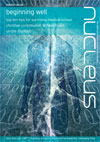'Where's home for you?' If you haven't worked out an answer before freshers' week starts, do it now. Along with 'what course do you do?' and 'which halls are you in?', it is one of the staples of conversation in queues to register, or at the first meeting of the medical school choir. Describing the exact location of the Warwickshire market town where I grew up was never easy, given that many of my student colleagues seemed rarely to venture outside the M25...
Jump forward four years, and it might be much harder to answer 'Where's home?' Once long holidays end, the connections you kept up back at your parents' home get weaker, and often your adopted university city becomes home. The former country-dweller realises that they haven't seen a green field for months!
Medical careers don't lend themselves to geographical stability in the early phases, and it may be that you are well into your thirties before you feel settled somewhere. Changing address often means changing church, so our spiritual foundations can also feel mobile; particularly after graduation, when the often close-knit fellowship of CU and student CMF is no longer there.
our true home
I'll always remember a CU staffworker (who happened to be married to a doctor) talking about this uncertainty. What surprised me was that she was so positive about it. She'd come to realise that her true home was with God, and that uncertainty here wasn't only to be expected, but a positive reminder that we wouldn't feel completely 'at home' on this fallen earth. Indeed Peter describes his readers as 'aliens and strangers in the world'. (1)
Sometimes this is quite obvious for the Christian. When our beliefs are subject not only to ridicule but outright hostility, or when we see disregard for human life, it isn't difficult to remember that we are exiles, not of this world. But this isn't always so obvious in healthcare. The vast majority of people that we work with are loving, compassionate and well-motivated, whether they hold any faith or none. It doesn't always feel like 'exile', and so it is easy to forget that the way we live is still very different.
how should we live?
Scripture gives us many principles for living, and thriving, despite these tensions. Here are a few of them:
1. submit
Whether to human authorities,(2) or within our homes or the church, (3) the principle is clear. We are to follow Christ's example. (4)
2. be holy
'Be holy because I am holy'. (5) Our actions should follow Jesus' example, and we should live as he intended us to. 'What would Jesus do?' is still a helpful question, though we must remember that we are not fully God as he was, so not everything will be identical (we are not, for example, called to walk across the ornamental lake on campus to reach our lectures).
3. seek the peace of the city
Jeremiah 29 records a letter sent by Jeremiah to the leaders of the exiled Jews in Babylon. Perhaps surprisingly, it commands them to 'build houses and settle down… marry and have sons and daughters', and to 'Seek the peace and prosperity of the city into which I have carried you into exile. Pray to the Lord for it, because if it prospers, you too will prosper'. (6)We should carry on our lives, and pray for the secular structures and institutions around us.
4. come out of her
In contrast, Revelation 18 details the fall of Babylon, probably referring to the fall of the secular dominance of the world. God's people are instructed to 'Come out of her, my people, so that you will not share in her sins'. (7) There is a point where we must be separate from the rest of the world, to avoid being pulled into sin.
These principles are sometimes in tension. Striving for holiness while submitting to the authorities is difficult, but possible. Do you submit to the authority of your consultant by inserting a cannula for a patient having an abortion, or do you place God's commands and the life of the baby involved first?
The balance between 'seek the peace' and 'come out of her' can be even harder. We might well 'seek the peace' on our campus as we serve on a student union council, but 'come out of her' as we make clear our opposition to decisions that might restrict the freedom of Christians to meet.
Being holy is a lifelong challenge. We have no hope of doing it for ourselves. Only God is holy. But through the Holy Spirit dwelling in us we are transformed to become more like him. (8)
not just surviving, thriving
The Bible of course has much more to say about these things; indeed the whole story of Scripture is the story of God's people working out God's plan in a world that doesn't honour the creator as he deserves. Although CMF's expertise mainly relates to challenges at the interface of Christian faith and medicine, other questions arise throughout our lives. If Jesus is really Lord over all our lives, then what he says applies not just to our lives in church, or even to medicine, but to everything we do; whether that's in politics or economics, music or sport. Much thought is likely to be needed to discern and live out the truth.
As we are 'transformed by the renewing of our minds', (9) we can really apply our faith to all areas of our lives. Not just to church, or to study, or to medicine, but to everything we do. It is by this way of engagement, rather than retreat from the world, that we will truly thrive in exile.
CMF Files
CMF Files are a series of papers tackling questions at the interface of Christianity and medicine. There are now 66 files available at www.cmf.org.uk/resources/publications/cmf-files
CMF File No. 54 — Christian doctors in the post-Christian society — explores the questions posed here in more depth.
Laurence Crutchlow is CMF Associate Head of Student Ministries and a GP in London
1. 1 Peter 2:11
2. 1 Peter 2:13
3. Ephesians 5:21
4. 2 Peter 2:23
5. 1 Peter 1:15
6. Jeremiah 29:5-7
7. Revelation 18:4
8. 2 Corinthians 3:18
9. Romans 12:2
































